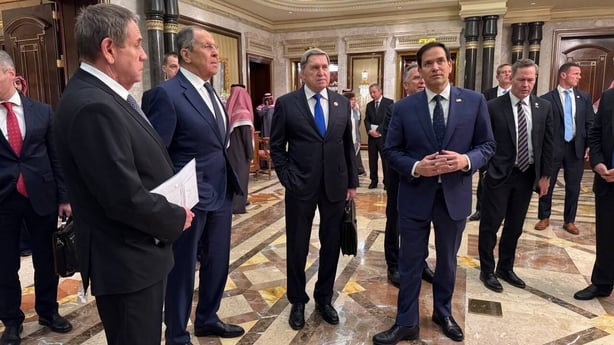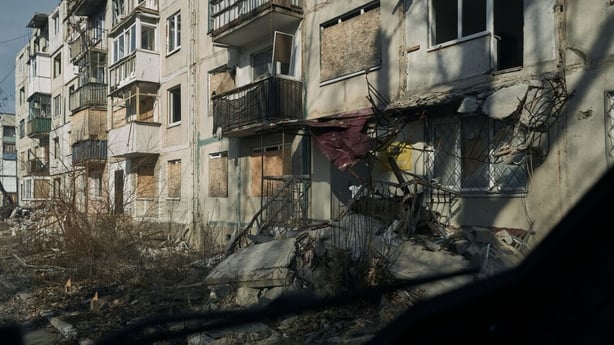On the week when officials from the United States and Russia met for talks in Saudi Arabia on ending the war in Ukraine, the leader of the Ukrainian opposition party said there has been little clarity provided to her country about what any future peace deal could look like.
"We know for sure right now that there is no concrete plan that would be laid on the table," Kira Rudik told Katie Hannon on Upfront: The Podcast.
"The truth is, I don't think that even Donald Trump and his team have a very good plan laid out - we are right now not in a point of making decisions, but rather in a point of gathering the information," Ms Rudik said.
Ms Rudik, a member of the Ukrainian Parliament since 2019, says uncertainty remains the only sure thing at this point.
"Right now, everybody's just figuring out what the story is. We have heard three different positions from three, maybe four even, officials from Donald Trump's administration," she said.
We need your consent to load this rte-player contentWe use rte-player to manage extra content that can set cookies on your device and collect data about your activity. Please review their details and accept them to load the content.Manage Preferences
Ms Rudik, who has been an outspoken critic of Russia's invasion, was speaking as US and Russian delegations met in Riyadh for talks.
There were no representatives from either Ukraine or the European Union present.
Amongst the plans floated by the US ahead of the talks was President Donald Trump suggesting that it is "unlikely" that Ukraine could return to its pre-2014 borders, when Russia annexed the Ukrainian territory of Crimea.
Ms Rudik says they have heard different suggestions from President Trump, his Defence Secretary Pete Hegseth, Vice President JD Vance and the US Special Envoy to Ukraine and Russia Keith Kellogg.
"They are not doing one voice policy because JD Vance said that he is not excluding the possibility of sending US troops into Ukraine, if necessary," Ms Rudik said.
"And Keith Kellogg said that that they do not have a plan, and they are gathering information. So, I think the truth is that even if they have some plan, it has not been laid out to Ukraine and presented in some coherent way," Ms Rudik added.
Security guarantees
Ms Rudik said they are trying to figure all of this out while still defending themselves from Russia.
"We don't know what's going to happen," she said.
"The main question for us still, no matter what is discussed in the world, is would we have enough of the air defence ammunition to take down the drones that are going our way every night?"
Ms Rudik says any ceasefire plan between Ukraine and Russia must have safeguards and "security assurances" in place given the poor efficacy of previous ceasefires that were agreed by both countries.
WATCH: Monday's Upfront with Katie Hannon's discussion about Donald Trump and Ukraine on the RTÉ Player
"How do we make sure that Russia would not attack us again if there is a so-called peace deal? We are asking this because we have been in this 'ceasefire' deal since 2014. I can tell you there was not a single day when this deal was actually honoured by Russia," she said.
In 2014, a ceasefire was brokered between Russia and Ukraine under the Minsk Protocol, aimed at halting the conflict in eastern Ukraine's Donbas region.
By January 2015, the Minsk Protocol ceasefire had collapsed.

"People were dying on the front line. Since that time, every day there were attacks. Who were we supposed to complain to about that? How were we supposed to act against this?" Ms Rudik said.
European army
While Ukraine's security guarantees remain a key priority for Ms Rudik and her colleagues in Kyiv, the broader security of the European continent has also come under increased scrutiny.
Calls by Ukraine’s President Volodymyr Zelensky at the recent Munich Security Conference for the creation of a European army to ensure the continent’s security have sparked considerable debate in recent days.
With EU leaders increasingly uncertain about the reliability of US support under Donald Trump’s presidency, Ms Rudik described Mr Zelensky’s suggestion as "a very strategic proposal" and noted that questioning how Europe would defend itself without US backing was "a very fair question".
"[The] Trump administration was starting to make it very clear that their priorities may lie in the Pacific and that Europe may not be a priority for them for the next couple of years," Ms Rudik said.
"That would mean that all of the hopes that European countries had for the US umbrella of security may not be working anymore," she added.
Confusion

Thirty-six months after Russia's February 2022 invasion, Ms Rudik says the mood across the country remains one of uncertainty and confusion.
"The truth is right now nobody knows what's happening and what's going to happen," she said.
"People are asking questions of what to expect. And the truth is we do not have a very good answer," Ms Rudik said.
Ms Rudik said one question she is asked repeatedly by her constituents is, 'What did we do wrong?’ to deserve being subjected to the ongoing war.
"We have been fighting for democratic values, and we want to just to live our life as a sovereign state that is not attacked by a very aggressive neighbour," she said.
"I can only promise them that I will do my best to make sure that even if there is a peace deal, that we get the best deal possible in it and work to make sure that our future is secured."
Ukrainians in Ireland
Ms Rudik also thanked Ireland and its people for helping Ukrainians who have fled the conflict.
Latest figures from the CSO show there were 109,566 arrivals to Ireland from Ukraine to the end of September of last year.
The figure is based on Public Service (PPS) numbers given to Beneficiaries of Temporary Protection (BoTP) from Ukraine since Russia’s invasion in February 2022.
"We are obviously so, so grateful for everything that has been done," Ms Rudik said.
Ms Rudik also recalled a meeting she had when she was in Ireland back in 2022.
"I met with Ukrainian refugees and there was this woman who came to hug me and she whispered in my ear, 'You wouldn't believe how good they are to us’.
"We are so grateful from my heart to yours for everything that you have done - opening your homes, providing the schools and support for our people."
Ms Rudik said the help Ireland has offered Ukraine and its people will be remembered for decades to come.
"This is generational, what you have done - our kids and our grandkids will remember that."
"I know that it has not been easy and you still have done it".
Listen to Kira Rudik speaking to Katie Hannon on Upfront: The Podcast here, on Apple Podcasts and on Spotify.
Watch Upfront with Katie Hannon on Monday at 10.35pm on RTÉ One and the RTÉ Player.

